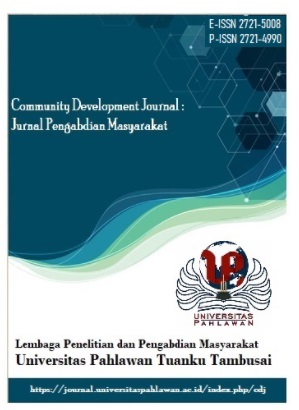THE EDUCATION OF CHARACTER BASED ON LOCAL WISDOM: A QUALITATIVE STUDY OF THE GAYO COMMUNITY OF CENTRAL ACEH
DOI:
https://doi.org/10.31004/jrpp.v6i3.26661Keywords:
Character Education, Local Wisdom, Gayonese CommunityAbstract
It is believed that the spread of various social illnesses among the students is the result of a lack of attention to the character education of the students. Today, the practice of character education has been enriched by the emergence of the idea of articulating local wisdom as its basis. The revitalization of local wisdom in educational practice is motivated by the belief that modernity with all its supporting tools is not enough to guide human beings to achieve a meaningful life. The modern educational praxis that is currently developing widely and is oriented towards economic and political demands has marginalized local values and culture, so that schools also play a significant role in alienating students from their socio-cultural context. The idea of developing local wisdom-based education is based on the belief that every community has a strategy for living life according to its context. The Gayo people have strategies and local wisdom guiding their people in leading their lives. This qualitative study will answers to the following questions: (1) What is the profile of the local wisdom of the Gayo community? (2) What aspects of the local wisdom of the Gayo community can be used as a basis for developing a character education model? The research specifically aims to describe the profile of the existence of local wisdom of the Gayo community in the current context; efforts to identify aspects of local wisdom of the current Gayo community that are considered relevant in developing character education; and formulating a conceptual model character education based on the local wisdom of the Gayo community.References
Al-Rasyidin Siregar, Batubara Parluhutan, dan K. B. (2009). Harmonisasi Agama dan Budaya di Indonesia. Jakarta: Balitbang Kemenag.
Asdiana. (2021). Analisis Pengembangan dan Penilaian Sikap Sosial Siswa Madrasah Ibtidaiyah. Jurnal Basedu, Vol. 6(No. 4), 5501–7663. https://doi.org/https://doi.org/10.31004/basicedu.v6i4.3291
Asmani, M. J. (2011). Buku Panduan Internalisasi Pendidikan Karakter di Sekolah. Yogyakarta: DIVA Press.
Bikers. (2000). Indigenous Environmental Knowledge and Its Transformation: Critical Anthropological Perspective. Australia: Hardword Academic Publisher.
Bowen, John, R. (1991). Sumatran Politics and Poetics: Gayo History, 1900–1989.
Bowen, J. (1993). Muslims Through Discourse: Religion and Ritual in Gayo Society. New Jersey: Princeton University Press.
Creasy. (2008). What is Character Educaton? Educational Policy, 3(12), 172–180.
Dhari, P. W. (2021). Analisis Penerapan Penguatan Pendidikan Karakter (PPK) dan Relevansinya dalam Pembelajaran Bahasa Indonesia di SDN 9 Kebayakan. Jurnal As-Salam, 5(2). https://doi.org/https://doi.org/10.37249/assalam.v5i2.298
Hidayati, N. A., Waluyo, H. J., Winarni, R., & S. (2020). Exploring the Implementation of Local Wisdom-Based Character Education among Indonesian Higher Education Students. International Journal of Instruction, 13(2), 179-198. https://doi.org/https://doi.org/10.29333/iji.2020.13213a
Hurgronye, C. S. (1996). Gayo: Masyarakat dan Kebudayaannya Awal Abad ke-20. Terjemahan Hatta Aman Hasnah. Jakarta: Balai Pustaka.
Kementerian Pendidikan National. (2011). Pedoman Pelaksanaan Pendidikan Karakter (Berdasarkan Pengalaman di Satuan Pendidikan Rintisan. Balitbang Kemendiknas.
Ketut Wiradnyana, T. S. (2011). Gayo merangkai identitas. Jakarta: Yayasan Pustaka Obor Indonesia.
Koentjaraningrat. (2009). Analisis Data Kualitatif: Buku Sumber Tentang Metode-Metode Baru. Penerjemah Tjetjep Rohendi Rohedi. Jakarta: Universitas Indonesia Press.
Koesoema, D. (2007). Pendidikan Karakter: Strategi Pendidikan Anak Secara Global. Jakarta: Grasindo.
Kupperman. (1990). Character. New York: Oxford University Press.
Lickona, T. (1991). Educating for Character: How our school can teach respect and responsibility. New York: Bantam Books.
Madjid, M. D. (2020). Sejarah Awal Islam di Gayo: Abad XI-XIV. Tangerang: Mahara.
Melalatoa, M. J. (1983). Kebudayaan Gayo. Jakarta: Balai Pustaka.
Melalatoa, M. J. (1997). Sistem Budaya Indonesia. Jakarta: FISIP UI dengan PT. Pamator.
Melalatoa, M. J. (2003). Gayo: Etnografi Budaya Malu. Jakarta: Kementerian Kebudayaan dan Pariwisata.
Melalatoa, M. J. (2006). Gayo: Budaya Malu. Jakarta: Lembaga Kajian Budaya Indonesia.
Moleong, L. J. (1999). Metode Penelitian Kualitatif. Bandung: Remaja Rosdakarya.
Paeni, M. (2003). Riak di Laut Tawar: kelanjutan tradisi dalam perubahan sosial di Gayo, Aceh Tengah. Jakarta: Arsip Nasional.
Perret, D. (2010). Kolonialisme dan Etnisitas: Batak dan Melayu di Sumatera Timur Laut. Jakarta: Kompas.
Peterson, Christoper, S. and M. E. . (2004). Character stengths and virtues: A Handbook and Classification. New York: Oxford University Press.
Robert K. Yin. (2011). Qualitative Research from Start to Finish. New York: The Guilford Press.
Rukiyati Sugiyo, L. A. P. (2017). Local Wisdom-Based Character Education Model in Elementary School in Bantul Yogyakarta Indonesia. Sino-US English Teaching, 14(5), 299–308. https://doi.org/doi:10.17265/1539-8072/2017.05.003
Sternberg, J. (2005). A Handbook of Wisdom: Psychological Perspective. Cambridge: Cambridge University Press.
Suwito. (1995). Konsep Pendidikan Akhlak Menurut Ibn Miskawaih. Jakarta: IAIN Syarifhidayatullah.
Syukri, M. (2007). Sarakopat: Sistim Pemerintahan Tanoh Gayo dan Relevansinya Terhadap Pelaksanaan Otonomi Daerah. Bandung: Citapustaka Media.
Timothy, R. (2005). Non-Western Educational Traditions: Indigenous Approaches to Educational Thought and Practice. New Jersey: Lawrence Erlbaum.
Wilhelm, G. M. (2005). A Comparative-Qualitative Research Analysis of Character Education in the Christian School and Home Education Milieu. Chedarvile University, Chedarvile.
Downloads
Published
How to Cite
Issue
Section
License
Copyright (c) 2024 Syamsul Bahri

This work is licensed under a Creative Commons Attribution-ShareAlike 4.0 International License.






